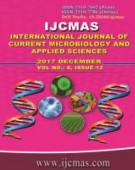


 National Academy of Agricultural Sciences (NAAS)
National Academy of Agricultural Sciences (NAAS)

|
PRINT ISSN : 2319-7692
Online ISSN : 2319-7706 Issues : 12 per year Publisher : Excellent Publishers Email : editorijcmas@gmail.com / submit@ijcmas.com Editor-in-chief: Dr.M.Prakash Index Copernicus ICV 2018: 95.39 NAAS RATING 2020: 5.38 |
Fatty acid composition of groundnut oil is an important trait from the point of human nutrition and oil stability during storage. Breeding groundnut for enhanced oil quality includes the development of cultivars with high oleic and low linoleic acid. In India, availability of breeding lines to improve groundnut oil quality is limited. Induction of genetic variability for fatty acid composition is desired and is a prerequisite in groundnut for its genetic improvement. The present work was undertaken to induce genetic variability for fatty acid profile using chemical (ethyl methanesulfonate) and physi¬cal (gamma rays) mutagens in two groundnut cultivars viz., GPBD-4 and TPG-41. In the M5 generation among the eight fatty acids studied, a greater magnitude of induced variation was observed for palmitic acid, oleic acid, linoleic acid and oleic/linoleic acid ratio (O/L). The induced variability was skewed towards high levels of oleic acid and low level of linoleic acid in GPBD-4. The EMS (0.5%) mutagen treatment in GPBD-4 resulted in higher magnitude of variability for oleic acid (39.01-75.16), linoleic acid (9.01-37.82) and O/L (1.03-8.34). However in TPG-41 the induced variability was skewed towards higher linoleic acid and low oleic acid with the mutagen treatment 200 Gy exhibiting greater range values for oleic acid (37.40-64.55), linoleic acid (16.53-38.33) and O/L (0.95-3.91). Further marker-assisted selection would be particularly valuable for use in improvement of the fatty acid profile of groundnut. Random amplified polymorphic DNA (RAPD) techniques were investigated for the development of molecular markers for genes controlling oleic and/or linolenic acid. A total number of 22 distinct mutants identified for fatty acid composition were assessed for molecular diversity using RAPD assay along with their respective parents revealed limited polymorphism. The RAPD marker OPAT 02 accounted for highest per cent polymorphism (80). High O/L types identified from mutant populations of both the genotypes were grouped into the same cluster suggesting close molecular relationship between them. Mutant GE-273 characterized by low O/L ratio (1.16) compared to parent, GPBD-4 (1.76) produced a very distinct band profile for most of the primers screened indicating lager extent of alteration in its DNA sequence. Further molecular studies on characterization coupled with sequence information for the genes involved in the fatty acid biosynthetic pathway might lead to the development of molecular markers that would help to increase the efficiency and accuracy of breeding for oil quality.
 |
 |
 |
 |
 |